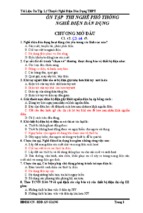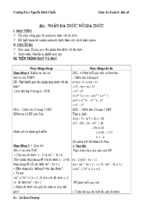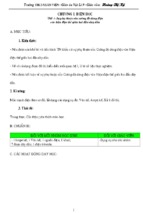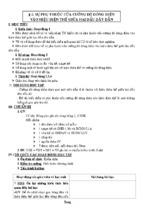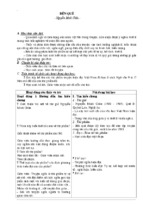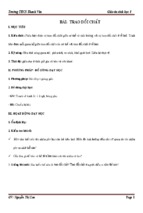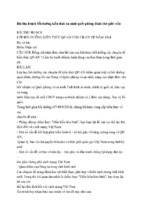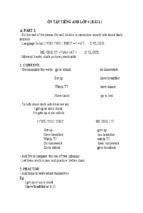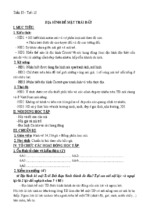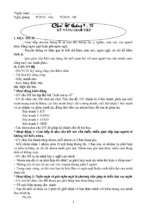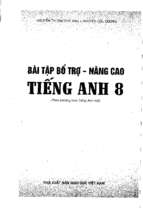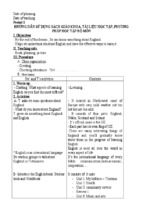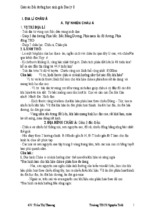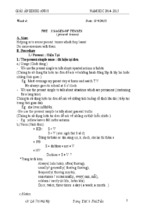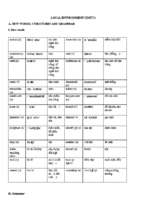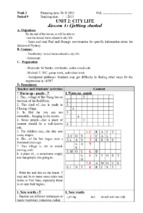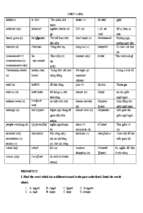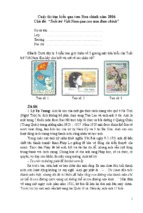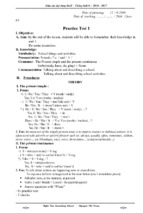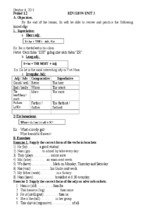đề luyện thi vào cấp 3 môn tiếng anh hot hơn 10000C đây
§Ò luyÖn sè 1
Your full name: ............................................................................ Point: ..........................................................
I/ Chän mét tõ mµ phÇn g¹ch ch©n cã c¸ch ph¸t ©m kh¸c víi c¸c tõ cßn l¹i.
1. a. baggy
b. casual
c. fade
d. fashion
2. a. comic
b. cotton
c. novel
d. grow
3. a. design
b. depend
c. religion
d. separate
4. a. climate
b. impress
c. primary
d. comprise
5. a. puppet
b. compulsory
c. tunic
d. publish
II/ Chän ®¸p ¸n ®óng nhÊt ®Ó hoµn thµnh c©u.
6. A forest fire ........... valuable wood, wildlife and good soil.
a. is destroyed
b. destroying
c. being destroyed
d. destroys
7. If I ........... Peter tonight, I ........... him my plans.
a. saw/told
b. will see/ will tell
c. see/will tell
d. will see/tell
8. ........... the drought, many people starved to death.
a. because
b. because of
c. in spite of
d. although
9. The hurricane was ..........., it knocked down all the houses on its way.
a. destructive
b. destroy
c. destruction
d. destroying
10. We had to suffer ........... a lot of floods due to our serious destruction of forests.
a. on
b. with
c. from
d. to
11. If you keep .........., that dog won’t hurt you.
a. slowly a walk
b. walking slowly
c. a slow walks
d. walking slow
12. I .......... for this position if I were you.
a. apply
b. would apply
c. applied
d. will apply
13. Nha Trang, .......... is a famous beach in Vietnam, is very crowded in summer.
a. whom
b. that
c. which
d. who
14. We would go to the sea if the weather .......... fine.
a. were
b. would be
c. is
d. be
15. He came in and did not say anything, .......... surprised us.
a. that
b. which
c. what
d. it
16. A newspaper .......... is published every day is called a daily newspaper.
a. that
b. which
c. what
d. a and b are correct
17. .......... I sympathize with your point of view, I can’t accept it. (sympathize: c¶m th«ng)
a. because
b. because of
c. despite
d. though
18. .......... the traffic was bad, he arrived on time.
a. although
b. even
c. in spite of
d. despite
19. .......... Mary didn’t like Tom, she agreed to work with him on the project.
a. since
b. despite
c. in spite of
d. although
20. It’s impossible .......... to get there in time.
a. to us
b. for us
c. with us
d. on us
III/ Chän ®¸p ¸n ®óng nhÊt ®Ó hoµn thµnh ®o¹n v¨n sau.
The second Sunday in May is Mother’s Day. It is a public holiday in both Britain and America. (21) .........
that day, children send Mother’s Day cards (22) ......... their mothers. They give their mothers flowers or sweets as
presents. Fathers and children do the cooking so that mothers can have a rest.
In the USA, Mother’s Day started in 1860s. There was a small town (23) ......... Prunty town in the middle
of the USA. People in the town fought against each other during a war. After the war, they hated each other. A
woman wanted the people (24) ......... friends with each other again so she started “Mother’s friendship Day”. On
that day, she visited all the other mothers in the town and said “Let us be friends with each other again.”
Her idea succeeded. The same thing (25) ......... in other parts of the country. After she died, her daughter
carried on her idea. In 1908, Mother’s Friendship Day became “Mother’s Day.
21. a. at
b. in
c. on
d. with
22. a. as
b. between
c. among
d. to
23. a. call
b. called
c. calling
d. to call
1
24. a. make
b. making
c. to make
d. made
25. a. happen
b. happening
c. to happen
d. happened
IV/ Chän lçi sai trong mçi c©u sau.
26. It is not difficult for us finding the office opposite our school.
A
B
C
D
27. The boy who plays the guitar good is my younger brother.
A
B
C
D
28. The girl whom you met last night was used to be a singer.
A
B
C
D
29. It isn’t easy to him to climb this mountain.
A
B
C
D
30. The river is dangerous for swimmers to swim in it.
A
B
C
D
V/ Chän c©u viÕt l¹i sao cho nghÜa kh«ng thay ®æi víi c©u cho s½n
31. It’s difficult to start looking for a job at my age.
a. I’m young, so it’s difficult to start looking for a job. b. It’s difficult for me to get employed at my age.
c. Getting employed at such ages is also difficult.
d. I don’t think I can start looking for a job now.
32. A place in which experiments are carried out is a lab.
a. A place where are carried out experiments is a lab.
b. A place where is a lab experiments are carried out.
c. A place carried out are where experiments is a lab.
d. A place where experiments are carried out is a lab.
33. A person who studies geology. He is called a geologist.
a. A person who studying geology called a geologist.
b. A person who studies geology is called a geologist
c. A person who studies geologist is called geology.
d. A person called a geology is a geologist.
34. A man who studies math. What do you call him?
a. What do you call a man, who studies math.
b. What do you call a man who studies math.
c. What do you call who a man studies math.
d. What do you call a man whom studies math.
35. A person teaches at university. He is a professor.
a. A person who teaches at university is a professor.
b. A person which teaches at university is a professor.
c. A person whom teaches at university is a professor.
d. A person taught at university is a professor.
VI/ §äc ®o¹n v¨n sau råi chän ®¸p ¸n ®óng nhÊt cho mçi c©u hái.
Some people say that wearing uniforms helps to identify a student of a certain school. The colours and the
shape of the uniforms differ one school to another. Now many children object to wear school uniforms but they
do not know that wearing uniforms encourages students to be proud of their school because the uniforms bear
their school’s name. Besides, wearing uniform helps students feel equal in many ways, whether they are rich or
poor and students don’t have to think of what to wear every day.
36. Wearing uniforms helps ..............
a. to know a student of a certain school.
b. to understand a student of a certain school.
c. to see a student of a certain school.
d. to distinguish a student of a certain school.
37. The colours and the shape of the uniforms are ..............
a. the same for every school.
b. different from one school to another.
c. not very different from one school to another.
d. not much the same from one school to another.
38. Many students don’t know that wearing uniforms makes them ..............
a. not fail from the examination.
b. proud of themselves.
c. feel self-confident
d. proud of their school.
39. Wearing uniforms helps students feel equal in many ways because other students don’t know if a certain
student is ..............
a. from city or country.
b. from rich or poor family.
c. intelligent or not.
d. lazy or hard-working
40. Many people think that wearing school uniforms ..............
a. makes students feel comfortable.
b. makes it difficult to identify a certain student in one class.
c. makes school more colourful and lively.
d. doesn’t make students think of what to wear every day
2
§Ò luyÖn sè 2
Your full name: ............................................................................ Point: ..........................................................
I/ Chän mét tõ mµ phÇn g¹ch ch©n cã c¸ch ph¸t ©m kh¸c víi c¸c tõ cßn l¹i.
1. a. collection
b. grocery
c. poetry
d. pagoda
2. a. advance
b. campus
c. label
d. relax
3. a. edition
b. experience
c. scenery
d. novel
4. a. publish
b. reputation
c. subject
d. puppet
5. a. rivalry
c. admire
c. unique
d. shrine
II/ Chän mét ®¸p ¸n ®óng nhÊt ®Ó hoµn thµnh c©u.
6. If you want to work for a foreign company, you .......... have perfect knowledge of English.
a. must
b. can
c. should
d. may
7. If you go to London, you .......... see the Big Ben Clock Tower.
a. must
b. have to
c. can
d. could
8. She said .......... books were hers.
a. this
b. that
c. these
d. those
9. She .......... me that she would visit Hanoi the next month.
a. said
b. said to
c. told to
d. spoke to
10. She asked me .......... I could speak both Japanese and Chinese well.
a. if
b. whether
c. how
d. a & b are correct
11. He told me .......... about my children because they were very OK.
a. not worry
b. not worrying
c. not to worry
d. not to worrying
12. They asked me .......... I liked doing in my free time.
a. what
b. if
c. which
d. that
13. The police asked him ..........
a. what is his name
b. what his name is
c. what was his name
d. what his name was
14. There is a shortage of .......... technicians in Vietnam nowadays.
a. well-qualification
b. well-qualify
c. well-qualifying
d. well-qualified
15. If you want to attend the course, you must pay the fee .......... advance.
a. on
b. for
c. in
d. to
16. She said she had to return home ..........
a. today
b. that day.
c. next day.
d. yesterday
17. He doesn’t want to study in a university which has no ..........
a. repute
b. reputation
c. reputed
d. reputedless
18. She went out of the room .......... saying any words to us.
a. to
b. with
c. but
d. without
19. Could you tell me how many chapters this book consists ..........
a. with
b. of
c. for
d. with
20. He asked me where I .......... the previous day.
a. go
b. went
c. will go
d. had gone
21. He has gone to Chine .......... last week.
a. for
b. sine
c. on
d. in
22. Lan is used .......... on the left because she has been in London for several months.
a. drive
b. to drive
c. to driving
d. to be driving
III/ Chän mét ®¸p ¸n ®óng nhÊt ®Ó hoµn thµnh ®o¹n v¨n sau.
TV is one of the man’s most (23) ......... means of communication. It brings events and sounds (24) .........
around the world into millions of homes. A person with a TV set can sit in his house and watch the president
making a (25) ......... or visit a foreign country. He can see a war being fought and watch statesmen try (26) .........
about peace. Through TV, home viewers can see and learn about people, places, and things all over the world. It
brings them coverage of American’s astronauts as they explore outer space.
In (27) ......... to all these things, TV brings its viewers a steady stream of programs that are (28) ......... to
entertain. In fact, TV provides (29) ......... entertainment programs than any other kinds. The programs include
action-packed dramas, light comedies, sporting events and motion picture.
23.
a. importance
b. important
c. unimportant
d. unimportance
24.
a. from
b. at
c. in
d. to
25.
a. speak
b. speaking
c. speech
d. spoken
25.
a. bring
b. brought
c. bringing
d. to bring
26.
a. viewers
b. seers
c. lookers
d. watchers
27
a. add
b. addition
c. besides
d. general
28.
a. made
b. designed
c. did
d. built
29.
a. many
b. much
c. more
d. most
IV/ §äc ®o¹n v¨n sau råi chän c©u tr¶ lêi thÝch hîp nhÊt cho mçi c©u hái.
3
Mr. Yates was nearly ninety so it was often difficult for him to remember things, but he still liked travelling very
much, so he and his wife went to Spain every year. One summer when they were there, they went to visit some
friends. These people had two young daughters. One afternoon Mr. Yates was talking to one of the girls in the
garden after lunch “You and you sister was ill when my wife and I here last year, weren’t you?”, he said to her.
“Yes, we were,” answered the girl. “We were very ill.” The old man said nothing for a minute, because he was
thinking. The at last he said, “Oh, yes. I remember now! One of you died. Which one of you was it, you or your
sister?” The girl answered, “It was me.” “Oh! I am very sorry to hear that,” said the old man.
30. Why did Mr. Yates not remember things very well?
a. Because he was an absent-minded man.
b. Because there was something wrong with his head
c. Because he was too old.
d. Because he didn’t want to bother his head about anything.
31. Where did his friend live?
a. in England
b. in France
c. In Spain
d. In Italy
32. Who were ill when Mr. and Mrs. Yates visited Spain another time?
a. their friends
b. their friend’s daughters c. their friend’s sisters
d. their friend’s parents.
33. Who really died then?
a. the girl whose sister was talking with Mr. Yates.
b. the girl who was talking with Mr. Yates.
c. the two girls who were ill.
d. nobody.
34. Was the girl having a joke with Mr. Yates?
a. Yes, she did.
b. Yes, she was
c. No, she didn’t
d. No, she wasn’t
V/ Chän lçi sai trong mçi c©u sau.
35. He looks familiar. I remember to meet him but I can’t remember exactly where.
A
B
C
D
36. On my way home from work, I stopped buying some food for my family.
A
B
C
D
37. The film was very interesting and we all enjoyed to see it.
A
B
C
D
38. You have never seen a tiger before, haven’t you?
A
B
C
D
39. Your mother didn’t used to go to work by motorbike, did she?
A
B
C
D
VI/ Chän c©u viÕt l¹i sao cho nghÜa t¬ng ®¬ng víi c©u cho s½n.
40. She said: “I’m buying a bike for my son next week.”
a. She said she was buying a bike for my son next week.
c. She said she was buying a bike for her son the next week.
b. She said she was buying a bike for her son next week.
d. She said I was buying a bike for her son the next week.
41. She asked him: “ Do you enjoy your stay here?”
a. She asked him did you enjoy your stay here.
b. She asked him did he enjoy his stay here.
c. she asked him if he enjoyed his stay here.
d. she asked him if he enjoyed his stay there.
42. She told me: “Don’t drink wine when you are driving.”
a. She told him not drink wine when he is driving.
b. She told him not to drink wine when he was driving
c. She told him not to drink wine when he is driving
d. She told him to not drink wine when he is driving
43. “Could you play the guitar well?” she said.
a. she asked if I could play the guitar well.
b. She asked me to play the guitar well.
c. She said she could play the guitar well.
d. She asked I could play the guitar well.
44. “Could you play the guitar?” she said.
a. she asked if I could play the guitar.
b. She asked me to play the guitar.
c. She said she could play the guitar.
d. She asked I could play the guitar.
45. She said to her students: “Listen and repeat after me.”
a. She asked her students to listen and repeat after her. b. She said to her students to listen and repeat after her
c. She told her students listen and repeat after her.
d. She told her students listened and repeated after her
§Ò luyÖn sè 3
Your full name: ............................................................................ Point: ..........................................................
I/ Chän mét tõ mµ phÇn g¹ch ch©n cã c¸ch ph¸t ©m kh¸c víi c¸c tõ cßn l¹i.
1. a. heat
b. scream
c. meat
d. dead
2. a. tease
b. beat
c. break
d. lead
3. a. meet
b. freeze
c. cheer
d. green
4. a. hit
b. bit
c. minute
d. like
5. a. miss
c. little
c. child
d. listen
II/ Chän ®¸p ¸n ®óng nhÊt ®Ó hoµn thµnh c©u.
6. They often decorated the house .......... beautiful flowers.
a. with
b. to
c. for
d. by
7. Tet is the holiday .......... in Lunar New Year.
a. celebrate
b. celebrated
c. which is celebrated
d. which celebrates
8. Everybody loves him because of his ..........
a. polite
b. politely
c. impoliteness
d. politeness
9. I don’t know what’s in the box. It .......... be a toy.
4
a. would
b. must
c. may
d. should
10. If I have good .........., I will have a good job.
a. qualify
b. qualified
c. qualification
d. quality
11. They made me ........... the whole story.
a. repeat
b. repeated
c. to repeat
d. repeating
12. Students must go to class .......... time.
a. on
b. by
c. at
d. into
13. This is the house .......... he was born.
a. when
b. which
c. where
d. why
14. This is the house in .......... he was born.
a. when
b. which
c. where
d. why
15. My bicycle is .......... order. I must repair it.
a. in
b. out of
c. within
d. off
16. It .......... in Lang Son in the winter of 2002.
a. snow
b. snowed
c. snowy
d. snows
17. The explorer .......... discovered America was Christopher Columbus.
a. whom
b. who
c. that
d. b & c are correct
18. Neil Armstrong, who first walked onto the moon, .......... in the USA.
a. lived
b. had lived
c. was living
d. is living
19. They have to go to school, .......... it is raining very hard.
a. even though
b. although
c. because
d. so
20. We are very hungry .......... we cannot eat anything.
a. and
b. although
c. but
d. so
21. Tom, a boy .......... I went to school with, is ill in hospital.
a. who
b. that
c. whose
d. which
22. she told me a story .......... I found hard to believe.
a. what
b. which
c. in which
d. at which
III/ Chän mét ®¸p ¸n thÝch hîp nhÊt ®iÒn vµo « trèng ®Ó hoµn thµnh ®o¹n v¨n.
Scientists have known a lot (23) .......... the earth. They understand how mountains are made and what a volcano
is. The following example is about volcanic eruptions. A volcano is a mountain that is open at the top. Smoke and
hot air come (24) .......... of the hole. Sometimes very hot rock also comes out of the mountain. That can make
troubles for people nearby. This is what happened with Mt. Vesuvius and Mt. St. Helens. Hot rock poured out of
Mt. Vesuvius and (25) .......... the town (26) .......... Pompeii in 79 AD. Everyone in the town was killed. The Mt.
St. Helens volcano didn’t kill many people because there were no cities (27).......... to the mountain but the hot
rock killed a large part of the forest. And a lot of dirt (28).......... on cities many miles away. Today, there are still
many difficult questions for scientists (29).......... study the earth. They do not know when a volcano will send hot
rock (30).......... the air. They still are not sure about the inside of the earth.
23.
a. about
b. to
c. for
d. of
24.
a. in
b. to
c. for
d. out
25.
a. cover
b. covering
c. covered
d. to cover
26.
a. with
b. of
c. for
d. about
27.
a. closed
b. close
c. closing
d. to close
28.
a. fall
b. felt
c. fell
d. feel
29.
a. who
b. whom
c. which
d. whose
30.
a. in
b. to
d. at
d. into
IV/ §äc ®o¹n v¨n råi chän c©u tr¶ lêi chÝnh x¸c nhÊt cho mçi c©u hái.
An exciting trip
I have just received a letter from my brother, Tim. He is in Australia. He has been there for six months. Tim is a
engineer. He is working for a big firm (c«ng ty) and he has already visited a great number of different places in
Australia. He has just bought an Australian car and has gone to Alice Springs, a small town in the centre of
Australia. He will soon visit Darwin. From there he will fly to Perth. My brother has never been aboard before, so
he is finding this trip very exciting.
31. Who was this passage written by?
a. Tim
b. Tim’s brother or sister
c. en engineer
d. Darwin
32. What is the writer’s brother’s name?
a. Tim
b. Darwin
c. Alice springs
d. Perth
33. What is Alice Springs?
a. It is a beauty spot in b. It is a small town in c. It is a big firm Tim d. It is Tim’s car.
Australia.
Australia.
works for.
34. Where will Tim fly to Perth from?
a. His home town
b. Alice Springs
c. Darwin
d. Australia
35. Why is Tim finding this trip exciting?
a. Because he has already visited a great number of b. Because he has just bought an Australian car on the
different places in Australia
trip.
c. Because he can fly to Perth.
d. Because it is the first time he has been aboard.
V/ Chän lçi sai trong mçi c©u sau.
36. We are going to make a boat trip around Ha Long Bay in next summer.
A
B
C
D
37. I wish my brother is here with me to share my happiness and success.
A
B
C
D
38. In noon, it was very hot, so they sat down under the shade of a big tree to have a rest.
A
B
C
D
5
39. Because he didn’t go to class yesterday so he couldn’t understand the lesson.
A
B
C
D
40. She wish she could find a good job in Hanoi.
A
B
C
D
VI/ Chän c©u viÕt l¹i sao cho nghÜa kh«ng thay ®æi.
41. They built this church in 18th century.
a. This church is built in 18th century.
b. This church was built in 18th century.
th
c. This church has been built in 18 century.
d. This church was build in 18th century.
42. My house is near the beach. I never go swimming there.
a. Though my house is near the beach, but I never go b. Though my house is near the beach, I never go
swimming there.
swimming there.
c. Despite being near the beach, I never go swimming d. a & c are correct.
there.
43. This shirt is too small for me to wear.
a. If this shirt weren’t small, I couldn’t wear it.
b. If this shirt isn’t small, I can wear it.
c. If this shirt wasn’t small, I could wear it.
d. If this shirt weren’t small, I could wear it.
44. The girl has just gone out. Do you know her?
a. Do you know the girl whose has just gone out?
b. Do you know the girl whom has just gone out?
b. Do you know the girl which has just gone out?
d. Do you know the girl who has just gone out?
45. She doesn’t go to China with us?
a. We wish she goes to China with us.
b. We wish she did went to China with us.
c. We wish she went to China with us.
d. We wish she can go to China with us.
§Ò luyÖn sè 4
Your full name: ............................................................................ Point: ..........................................................
I/ Chän mét tõ mµ phÇn g¹ch ch©n cã c¸ch ph¸t ©m kh¸c víi c¸c tõ cßn l¹i.
1. a. put
b. cut
c. full
d. pull
2. a. tool
b. book
c. look
d. cook
3. a. musician
b. student
c. mute
d. June
4. a. make
b. daily
c. paper
d. family
5. a. still
b. night
c. Friday
d. life
II/ Chän ®¸p ¸n ®óng nhÊt ®Ó hoµn thµnh c©u.
6. These are the books ........... my father wrote when he was young.
a. whose
b. what
c. which
d. on which
7. A person ........... from Holland is called Dutch.
a. who comes
b. whom comes
c. who come
d. whom come
8. The building was damaged last week and it ........... yet.
a. wasn’t repaired
b. hasn’t repaired
c. hasn’t been repaired
d. didn’t repair
9. Where is the book ........... he gave you on your birthday?
a. who
b. whom
c. which
d. whose
10. Many houses have been built in Hanoi ...........
a. since beginning of this year b. for the year before last year
c. for last year
d. since 5 years ago.
11. Two more bridges ........... across the Red river recently.
a. are being built
b. were built
c. has been built
d. have been built
12. A new program on education for disable people has been developed ........... VTV2.
a. in
b. on
c. for
d. by
13. I’d like to watch the news. Please ........... the TV.
a. turn on
b. turn off
c. turn up
d. turn down
14. The news is always ........... at 7 p.m.
a. in
b. on
c. at
d. for
15. He went in ........... them of his decision.
a. inform
b. to inform
c. to informing
d. information
16. Where’s David? – He’s ........... for holiday.
a. been
b. gone
c. taken
d. had
17. The government is responsible ........... the provision of health care.
a. with
b. to
c. for
d. of
18. John is very good ........... computers.
a. in
b. at
c. with
d. to
19. The house ........... into five rooms.
a. divides
b. is divided
c. divided
d. is dividing
20. John completed the presentation in an ........... way.
a. interaction
b. interactive
c. interactively
d. interacting
21. Stamp ........... is one of his hobbies.
a. collect
b. collection
c. collecting
d. collected
22. The decided to go for a picnic ........... the cold weather.
a. because of
c. because
c. although
d. in spite of
III/ Chän ®¸p ¸n ®óng nhÊt ®Ó hoµn thµnh ®o¹n v¨n sau.
6
When Malaysia became (23) ..........., Malay language was chosen as the national language. The reason
(24) ........... this choice is that it is the language of the Malays who are the natives of Malaysia. The (25) ...........
of Malaysia takes pride in promoting this language among all the races in Malaysia. The Chinese, the Indians and
other non-Malay communities have accepted the decision of the government. It is the (26) ........... language
(27) ........... the country. In Malaysia, the national language is (28) ........... the Bahasa Malaysia. It is the language
of ( 29) ........... in schools. Since the introduction of Malay in schools, it has become the most (30) ........... used
language in Malaysia.
23.
a. independence
b. independ
c. dependent
d. independent
24.
a. for
b. in
c. since
d. at
25.
a. govern
b. government
c. governor
d. governing
26.
a. office
b. official
c. officer
d. officially
27.
a. in
b. to
c. of
d. for
28.
a. call
b. calling
c. to call
d. called
29.
a. instruction
b. instruct
c. instructive
d. instructively
30.
a. wide
b. widen
c. widely
d. widening
IV/ §äc ®o¹n v¨n sau råi chän c©u tr¶ lêi thÝch hîp nhÊt cho mçi c©u hái.
Everyone wants to reduce pollution but the pollution problem is as complicated (nghiªm träng) as it is
serious. It is complicated because much pollution is caused by things that benefit people. For example, exhaust
(khÝ th¶i) from automobiles causes a large percentage of all air pollution but the automobile provides
transportation for millions of people. Factories discharge (x¶) much of material that pollutes the air and water but
factories give employment to a large number of people.
Thus, to end or greatly reduce pollution immediately, people would have to stop using many things that
benefit them. Most of the people do not want so, of course. But pollution can be gradually reduced in several
ways. Scientists and engineers can work to find ways to lessen the amount of pollution that such things as
automobiles and factories cause. Government can pass and enforce laws that require businesses and traffic to
stop, or cut down on certain polluting activities.
31. Why is pollution complicated?
a. Because it is serious.
b. Because it causes air pollution
c. Because it is caused by things that benefit people.
d. Because it causes air and water pollution.
32. Which of the following is mentioned as beneficial things to people?
a. transportation
b. employment
c. discharge
d. a and b are correct
33. What does exhaust from automobiles cause?
a. a large percentage of all air pollution
b. a large percentage of rubbish.
c. a large percentage of unemployment.
d. a small percentage of all air pollution.
34. What would happen if people ended or reduced pollution immediately?
a. They didn’t want to do that.
b. They would have to stop using many things that benefit them.
c. They would have to use automobiles.
d. They would have to employ a large number of employment.
35. Who can work to find ways to lessen the amount of pollution?
a. nobody
b. scientists and engineers c. only scientists
d. only engineers
V/ Chän lçi sai trong mçi c©u sau.
36. The air in the country is fresh because of there is not much traffic.
A
B
C
D
37. Man is constantly being doing harm to the environment.
A
B
C
D
38. The earth is being threaten and the future looks bad.
A
B
C
D
39. If we don’t hurry up, we will be late to the concert.
A
B
C
D
40. Pollution is one of the most urgent problem in Vietnam.
A
B
C
D
VI/ Chän c©u viÕt l¹i cã nghÜa t¬ng ®¬ng víi c©u cho s½n.
41. The last time I used a fax machine was one year ago.
a. I haven’t used a fax machine for a year.
b. I have used a fax machine since a year.
c. I have used a fax machine for a year.
d. I have used a fax machine a year ago.
42. Nobody has seen these documents.
a. These documents have ever been seen.
b. These documents have been ever seen.
c. These documents have never been seen.
d. These documents have been never seen.
43. Nam cannot speak English better then Tim.
a. Tim speaks English as well as Nam.
b. Tim speaks English better than Nam.
c. Tim cannot speak English as well as Nam.
d. Tim speaks English the best.
44. Jane missed the bus. She went to school late.
a. Jane went to school late although she missed the bus b. Jane went to school late because she missed the bus.
c. If Jane missed the bus, she would go to school late.
d. In spite of missing the bus, Jane went to school late.
45. I can’t put on these shoes. They are too small for me.
a. My feet are not big enough for these shoes.
b. These shoes are not big enough for my feet.
c. My feet are too small to get in these shoes.
d. These shoes are not small enough for my feet.
7
§Ò luyÖn sè 5
Your full name: ............................................................................ Points....................................................
I/ Chän mét tõ mµ phÇn g¹ch ch©n cã c¸ch ph¸t ©m kh¸c víi c¸c tõ cßn l¹i.
1. a. author
b. other
c. there
d. they
2. a. chin
b. chat
c. character
d. chalk
3. a. switch
b. stomach
c. match
d. catch
4. a. forest
b. control
c. product
d. ecology
5. a. garbage
b. village
c. manage
d. stage
II/ Chän ®¸p ¸n ®óng nhÊt ®Ó hoµn thµnh c©u.
6. “Believe, dream, hope” was ......... the writer wanted to tell the children.
a. how
b. when
c. what
d. where
7. If my mother ......... her right now, she would help me decide.
a. were being
b. were
c. had
d. was
8. He quitted school ......... fourteen to become a sailor.
a. on
b. in
c. at
d. by
9. They wish that they ......... their plan on time.
a. would finish
b. finish
c. will finish
d. finished
10. I’ll call the hotel and confirm a ......... for us for Friday night.
a. protection
b. reservation
c. conversation
d. preservation
11. My mother does not like music. Neither .........
a. my father likes
b. does my father
c. doesn’t my father
d. my father doesn’t like
12. His parents are old and he doesn’t to rely ......... them for his expenses.
a. with
b. for
c. on
d. to
13. I wish you would ......... a little better when we have visitors.
a. affect
b. compose
c. conduct
d. behave
14. You shouldn’t stay at home so much. Get ......... and make new friends.
a. by
b. out
c. over
d. away
15. Jennet is used to ......... breakfast very early with rice.
a. have
b. having
c. has
d. had
16. My colleague was proud ......... finishing the work in such a short time.
a. about
b. on
c. over
d. of
17. I like to ......... touch with old friends but I have very little time.
a. get into
b. be in
c. lose
d. keep in
18. Despite the fact ........., Lisa went on the stage.
a. she was ill
b. that she was ill
c. which she was ill
d. she being ill
19. The audience is looking forward to ......... the superstar.
a. meet
b. met
c. meeting
d. to meet
20. Cattle and sheep are grazing in the .........
a. rivers
b. meadows
c. bridges
d. fields
21. They have some ......... students for the program.
a. to exchange
b. exchange
c. exchanging
d. exchanged
22. This test must be done .........
a. care
b. careful
c. carefully
d. none is correct
III/ Chän lçi sai trong mçi c©u sau.
23. Teaching is a hard work and she enjoys it because she loves working with children.
A
B
C
D
24. I suggest to go to the cinema tonight.
A
B
C
D
25. If we continue to use fuels at the current rate, we would soon have to face a fuel crisis.
A
B
C
D
26. Energy being the power from sources such as electricity and coal that make machines work or provides heat.
A
B
C
D
27. We all know which the world’s energy resources are limited.
A
B
C
B
IV/ Chän ®¸p ¸n ®óng nhÊt ®Ó hoµn thµnh ®o¹n v¨n.
Our modern world needs large amount of oil for (28) .......... and modern means (29) .......... transport. But
oil was first (30) .......... and used thousands of years ago. In ancient times, it was burnt in oil lamps for light
(31) .......... night. Boats were also covered with it to keep water out. It was also used as a surface for roads by the
Chinese. About 100 years ago, far more oil was suddenly needed because modern transport and industry
(32) .......... Oil wells were drilled and large amounts of oil were (33) .......... in many parts of the world,
(34) .......... the Middle East and the USA. Today, oil is more difficult to find, but new supplies are still (35) ..........
Nearly 50 million barrels of oil are pumped from the ground every day.
28.
a. industry
b. industrial
c. industrialize
d. industrialism
29.
a. at
b. for
c. of
d. to
30.
a. know
b. knew
c, known
d. known
31.
a. in
b. at
c. on
d. for
32.
a. developed
b. develop
c. developing
d. to develop
33.
a. find
b. finding
c. found
d. finded
34.
a. include
b. including
c. included
d. inclusion
35.
a. discover
b. discovering
c. to discover
d. discovered
V/ §äc ®o¹n v¨n sau råi chän c©u tr¶ lêi thÝch hîp nhÊt cho mçi c©u hái
8
Tomorrow, Linda, my best friend, is going to celebrate her 20 th birthday. I am going to make her a cake
and a beautiful birthday card. I will also buy her a big bunch of roses. I think that will be a big surprise for her.
Apart from me, there are going to be ten other people attending the party. They are her neighbours whom I have
already known. Linda has 19 classmates but they will not come because she has given another party at school. To
tell the truth, I am quite comfortable with this because I am always nervous when I have to talk to new people.
As Linda’s closest friend, I will come early to help her prepare for the party. We will have to move her
bed to her parents’ room because it takes so much space. We will move the bonsai from the balcony into her
room to make it more beautiful. I really hope that the party will be a pleasant one.
36. What does the passage mainly discuss?
a. a birthday present
b. attending a birthday party
c. preparation for a birthday party
d. activities in a birthday party.
37. According to the passage how many people will come to the party?
a. 10
b. 11
c. 19
d. 16
38. What does the word “this” in bold refer to?
a. Linda’s classmates.
b. The fact that Linda’s classmates will not join the party.
c. The school
d. The fact that there will be only 10 people in the party.
39. It can be inferred from paragraph 1 that ........ (infer from: suy ra tõ)
a. the writer doesn’t like Linda’s classmates
b. Linda’s classmates dislike her so much that they
will not come to her birthday party.
c. Linda only invites her neighbours to the party.
d. The writer has difficulty making new friends.
40. Where exactly will the party be held?
a. in her parents’ room
b. in the balcony
c. on her bed
d. in Linda’s room
VI/ Chän c©u s¾p xÕp l¹i ®óng víi nh÷ng tõ gîi ý ®· cho
41. very / taught / grateful / to / meet / I’m / Mrs. Lan / me / , / who / English.
a. I’m very grateful to meet Mrs. Lan, who taught me b. I’m very grateful to meet Mrs. Lan, who taught
English.
English me.
c. Mrs. Lan very grateful to meet I’m, who taught me d. I’m grateful very to meet Mrs. Lan, who taught me
English.
English.
42. hear / what / do / us / to / can / you / teacher / our / telling / is?
a. Can you hear what is our teacher telling us to do?
b. Is our teacher telling to hear what you can do us?
c. Can you hear what our teacher is telling us to do?
c. Can our teacher hear us what is telling you to do?
43. do / know / girl / is / over / who / the / there / standing / you?
a. Do you know who the girl standing over there is?
b. Do you know the girl standing over there is who?
c. Do you know who is the girl standing over there?
d. Do you know the girl who standing over there is?
44. be saved / a lot of / and / energy / by recycling / resources / can.
a. Energy can be saved by a lot of resources and recycling.
c. A lot of energy and resources can be saved by recycling.
b. A lot of recycling can be saved by energy and resources.
d. By a lot of recycling, can be saved energy and resources.
45. have / people / discovered / of / new / a / source / energy.
a. People discovered have a new source of energy.
b. People have discovered a new source of energy.
c. a new source of energy have discovered people.
d. People have a new source of energy discovered.
§Ò luyÖn sè 6
Your full name: ............................................................................ Points....................................................
I/ Chän mét tõ mµ phÇn g¹ch ch©n cã c¸ch ph¸t ©m kh¸c víi c¸c tõ cßn l¹i.
1. a. natural
b. language
c. nation
d. ladder
2. a. structure
b. eruption
c. result
d. consume
3. a. baggage
b. courage
c. damage
d. invasion
4. a. kitchen
b. Christmas
c. challenge
d. exchange
5. a. proud
b. house
c. how
d. pour
II/ Chän mét ®¸p ¸n ®óng nhÊt ®Ó hoµn thµnh c©u.
6. Jane Eyre, which ........... by Charlotte Bronte, is one of my favourite novels.
a. was written
b. wrote
c. written
d. be written
7. What would you do if you ........... a million pounds? (pound: b¶ng Anh)
a. win
b. would win
c. won
d. b &c are correct
8. I am not sure where to go for my holiday but I ........... go to Italy.
a. can
b. would
c. may
d. must
9. I can’t help you. Why don’t you ask Tom? He ........... be able to help you.
a. need
b. might
c. could
d. should
10. There ........... be a meeting on Friday because the director is ill.
a. might not
b. might
c. will
d. can
11. Something should be done about ........... waste so that the air is less polluted.
a. industrial
b. industry
c. industrialize
d. industrialization
12. Heavy floods ........... swept through central area have killed fifteen people and left hundreds homeless.
a. which
b. it
c. what
d. whose
13. The cold weather ........... damaged crops swept from the north.
a. it
b. what
c. which
d. its
14. There is no way to predict ........... lightning will strike.
a. who
b. where
c. which
d. that
9
15.Millions of dollars have been spent on campaigns ........... prevent forest fires.
a. to
b. in order
c. so
d. so as that
16. If we can’t prevent it in advance, the hurricane ........... destroy the coastal towns.
a. could
b. would
c. will
d. won’t
17. Canada’s forest fire season usually starts ........... April.
a. at
b. during
c. in
d. on
18. Areas of Africa were ........... by drought.
a. done
b. affected
c. suffered
d. caused
19. The heavy rain ........... floods in houses by the river.
a. caused
b. made
c. did
d. resulted
20. There was ........... rain yesterday that several road were flooded.
a. too much
b. so much
c. too many
d. so many
21. We have to suffer ........... a lot of floods due to our serious destruction of forests.
a. on
b. with
c. from
d. to
22. The man ........... standing over there is my teacher.
a. whom
b. whose
c. which
d.
III/ Chän lçi sai trong mçi c©u sau.
23. They tried to stop the storm from strike the town and they were successful.
A
B
C
D
24. This is the house when Uncle Ho used to live when he was young.
A
B
C
D
25. Nguyen Du, that wrote Kieu Story, was a great Vietnamese poet.
A
B
C
D
26. Bird’s flu is a serious epidemic in many country now.
A
B
C
D
27. Professor Lam, who gave a lecture at our university last Monday, is an famous physicist.
A
B
C
D
IV/ Chän ®¸p ¸n ®óng nhÊt ®Ó hoµn thµnh ®o¹n v¨n sau.
In many countries nowadays, electricity, gas and water are (28) ........... Companies which produces
household goods realize that consumers want (29) ........... that both work effectively and save money. In
North America, for example, household lighting accounts for (30) ........... 10% to 15% of the electricity bill.
(31) ........... this amount can be reduced by replace an ordinary 100-watt light bulb with an energy-saving
one. Consumers can save about US $7 to US $21 per bulb by doing so. In Europe, when you buy electrical
goods, (32) ........ as refrigerator, freezers and washing machine, there is a labeling scheme telling you how
(33) ........ efficient each model is, so you can compare with (34) ....... appliances and then choose which one
to buy. The final result is that these (35) ........ will save money as well as conserve the earth’s resource.
28.
a. necessary
b. necessities
c. necessarily
d. necessitate
29.
a. produce
b. products
c. production
d. productive
30.
a. for
b. in
c. at
d. from
31.
a. so
b. and
c. although
d. but
32.
a. so
b. such
c. therefore
d. if
33.
a. energetic
b. energize
c. energetically
d. energy
34.
a. different
b. differ
c. differently
d. difference
35.
a. innovate
b. innovative
c. innovations
d. innovator
V/ §äc ®o¹n v¨n sau råi chän c©u tr¶ lêi thÝch hîp nhÊt cho mçi c©u hái.
Personal computers, or PCs, are an important part of our everyday lives. Many people cannot imagine life without
them. One of the most important people in making these machines work is Bill Gates. He was born in 1955 in
Washington State. He grew up in a rich family. His parents sent him to a private school. There he met his business
partner, Paul Allen. When they were in 8th grade, they were writing programs for business computers and making
money. In 1973 Bill was accepted at Harvard University to become a lawyer as they wished. Two years later, he
dropped out of Harvard to work on a computer program with his friend Allen. They worked 18 hours a day in a
dormitory room at Harvard. They were writing a program that would run one of the first personal computers. In
1975, they created a company called Microsoft to sell their products.
Allen became ill with cancer and left Microsoft in 1983. He recovered a few years later and started his own
company while Microsoft became a giant company. Gates was the youngest millionaire in the history of the USA.
He was the “King of software” He had a dream and the will to succeed and by 1977, he was the richest man in
the USA.
36. According to the author, ..............
a. Bill Gates is one of the most important people in making PCs.
b. Gates used to be sent to a public school.
c. Gates used to study at Harvard University.
c. many people wouldn’t be without their PCs.
37. The word “will” in the last paragraph could be best replaced by which of the following?
a. good fortune
b. future
c. strong wish
d. possibility
38. Which of the following words means “no longer have”?
a. get over
b. dropped out of
c. left
d. run out of
39. From reading the passage, it seems that ........
a. the world has become very dependent on PCs.
b. Gates succeeded easily because of his rich family.
c. Gates created Microsoft because he wanted to be the c. Gates’ parents wanted him to become a computer
“King of software”
programmer.
40. Which of the following is not true?
a. Gates met his business partner in school
b. They created Microsoft to sell program for PCs.
b. The secret of Gates’ success is hard work.
d. Paul Allen left Microsoft because he was ill.
VI/ Chän c©u viÕt l¹i sao cho nghÜa kh«ng ®æi so víi c©u cho s½n.
10
41. They couldn’t go out because of the storm.
a. The storm prevented them from going out.
c. There is a storm so they couldn’t go out.
42. “Would you like to go out with us?”
a. She said to me if I would like to go out with them.
c. She invited me going out with them.
43. I like watching TV more than reading newspapers.
a. I enjoy both watching TV and reading newspapers.
c. I prefer watching TV to reading newspapers.
44. It took them two years to build the hotel.
a. The time to build the hotel were two years.
c. They spent two years to build the hotel
45. He is interested in collecting stamps.
a. He loves collecting stamps.
c. He is forced to collect stamps
b. The storm stopped them to go out.
d. They were prevented going out by the storm.
b. She invited me to go out with them
d. She asked me to go out with them
b. I prefer watching TV than reading newspapers.
d. I like watching TV and reading newspapers.
b. They need two years to build the hotel.
d. They spent two years building the hotel.
b. He would rather collect stamps.
d. He is keen in collecting stamps.
§Ò luyÖn sè 7
Your full name: ............................................................................ Points....................................................
I/ T×m mét tõ mµ phÇn g¹ch ch©n cã c¸ch ph¸t ©m kh¸c víi c¸c tõ cßn l¹i.
1. A. abroad
B. primary
C. pal
C. additional
2. A. invited
B. wanted
C. ended
D. liked
3. A. beach
B. lead
C. great
D. pleased
4. A. unit
B. climate
C. city
D. ethnic
5. A. comb
B. plumb
C. climb
D. disturb
II/ Chän ®¸p ¸n thÝch hîp nhÊt ®Ó hoµn thµnh nh÷ng c©u sau.
7. It was a boring weekend, I ............ anything.
A. did
B. don’t do
C. didn’t do
D. would do
8. I was very ............ by the efficiency of the staff.
A. impressed
B. corresponded
C. comprised
D. interested
9. I rarely eat ice-cream now but I ............ it when I was a child.
A. eat
B. used to eat
C. am eating
D. has eaten
10. Nam wishes he ............ Ba some money for his rend.
A. lend
B. can lend
C. could lend
D. lends
11. I haven’t spoken to her ............ she went to London.
A. for
B. since
C. ago
D. last year
12. I have been here ............ an hour. Where have you been?
A. for
B. ago
C. yesterday
D. since
13. She has moved ............ Ho Chi Minh city with her family.
A. in
B. to
C. into
D. onto
14. Students and workers like wearing jeans ............ their durability and convenience.
A. instead of
B. because
C. because of
D. as
15. In the 1980s more and more people liked wearing jeans and they became ............ fashion clothing.
A. high
B. big
C. tall
D. long
16. The majority of Vietnamese women prefer to wear modern clothing ............ work.
A. in
B. at
C. for
D. on
17. What a pity! You aren’t here with us now. I wish you ............
A. were
B. are
C. had been
D. was
18. She ............ a letter when the telephone rang.
A. wrote
B. was writing
C. was written
D. has written
19. Tim ............ go fishing with his father when he was young.
A. used to
B. is used to
C. has used to
D. used
20. Now fashion designers want to change the ............ ao dai.
A. tradition
B. traditional
C. traditionally
D. trady
21. Jeans have never been ............ fashion.
A. on
B. out
C. in
D. out of
22. Children were made ............ to bed at 9.30 p.m.
A. to go
B. go
C. for go
D. going
23. She had to go to the cinema on her own ............ no one wanted to go with her.
A. so
B. however
C. because
D. because of
24. Streets are ............ with colourful lights and blue banners.
A. shown
B. decorated
C. seen
D. given
25. At the end of the day, we watch a little TV ............ going to bed.
A. to
B. for
C. after
D. before
III/ §äc ®o¹n v¨n sau chän ®¸p ¸n thÝch hîp nhÊt ®iÒn vµo « trèng.
Sally had a very exciting summer vacation this year. Her (30)........... friend invited her to visit her family
in the south of France. Sally (31) ........... by plane from London to Paris. Marie, her pen friend (32) ........... her at
the airport and they took a train from Paris to Marseilles (33) ........... Marie’s family lives. It is a large port. A lot
of people live in Marseilles and there are many interesting shops and cafes there. Sally started learning French at
school two years (34) ........... and she spoke French all the time with Marie and her family.
26. A. pencil
B. pen
C. book
D. letter
27. A. went
B. caught
C. took
D. got
11
28 A. waited
B. visited
C. saw
D. met
.
29. A. here
B. where
C. there
D. place
30. A. then
B. now
C. ago
D. already
IV/ §äc ®o¹n v¨n sau vµ chän c©u tr¶ lêi thÝch hîp nhÊt cho mçi c©u hái
Japanese Kimonos
The Kimono, a robeline dress, is the traditional garment of Japan. Although most Japanese people now
wear western-style clothing, they wear kimonos on holidays and other special occasions. These women have
wrapped their kimonos with a sash called an obi.
Although the kimono remained essentially unchanged as the basic article of clothing for Japanese women
for centuries, colors and patterns changed according to the current fashion, as did the way of wearing kimonos.
Social conventions also influenced kimono style. A kimono with a brightly colored flower pattern and long
dangling sleeves was, and is still regarded ad suitable only for a young, unmarried woman.
31. The passage is about a kind of traditional clothing that ...........
A. is no longer in B. has become casual
C. is now worn on certain D. has become a western
existence
occasion
style
32. According to the passage, the kimono is compared to ...........
A. robe
B. a flower
C. a garment
D. an obi
33. What is NOT mentioned in the passage as a change in the kimono?
A. color
B. style
C. material
D. pattern
34. Kimono styles are also determined by ...........
A. the western style
B. the marriage status
C. social convention
D. special occasion
35. The kind of kimono worn by young, unmarried women is described as ...........
A. essentially unchanged
B. basic clothing
C. western-style clothing
D. brightly colored
V/ T×m mét lçi sai trong mçi c©u sau.
36. Many Vietnamese women today prefer to wear modern clothes at work because it is more convenient.
A
B
C
D
41. Fashion designers have made the “ao dai” as a dress unique, which is both traditional and fashionable.
A
B
C
D
37. Mary, the missing girl, was reported wearing a brown trousers and a blue T-shirt.
A
B
C
D
38. To tell you the truth, I haven’t met Nam, my close friend, since six months.
A
B
C
D
39. According to the city council, a new bridge are going to be built in the area.
A
B
C
D
40. She used to asked me for help.
A B C D
VI/ Chän c©u viÕt l¹i thÝch hîp nhÊt cho mçi c©u sau.
41. They are fixing a machine.
A. A machine is being fixed.
B. A machine is fixed.
C. A machine is fixing.
D. A machine is fix by them.
42. They didn’t finish their work.
A. Their work finish.
B. Their work isn’t finished
C. Their work wasn’t finished.
D. Their work were finished.
43. They speak English all over the country.
A. English is spoke all over the country.
B. English is spoken all over the country.
C. English is speaking all over the country.
D. English is speak all over the country.
44. They have hired Peter to do this job.
A. Peter has been hired to do this job.
B. Pater has hired doing this job.
C. Peter has hired to do this job.
D. Peter has be hired to do this job.
45. Tom is a careful driver.
A. Tom drives very carelessly.
B. Tom drives carefully.
C. Tom drive careless
D. Tom drives careful.
§Ò luyÖn sè 8
Your full name: ............................................................................ Points....................................................
I/ T×m mét tõ mµ phÇn g¹ch ch©n cã c¸ch ph¸t ©m kh¸c víi c¸c tõ cßn l¹i.
1. A. flood
B. typhoon
C. groom
D. balloon
2. A. locate
B. celebrate
C. nominate
D. private
3. A. hobby
B. honest
C. humor
D. hole
4. A. loved
B. returned
C. tried
D. visited
5. A. rises
B. articles
C. traces
D. watches
II/ Chän ®¸p ¸n ®óng nhÊt ®Ó hoµn thµnh c¸c c©u sau.
12
6. Computer is one of the most important ........... of the 20th century.
A. invent
B. to invent
C. inventions
D. inventor
7. We have just had our house ...........
A. rebuild
B. rebuilt
C. to rebuild
D. rebuilding
8. Let’s go shopping, ...........?
A. shall we
B. can we
C. do we
D. should we
9. He runs ........... to get there first.
A. enough fast
B. fast enough
C. enough to fast
D. to fast enough
10. They ........... in Hanoi since last Monday.
A. have been
B. were
C. are
D. will be
11. I don’t know how to drive this car. I wish I ........... it.
A. drive
B. could drive
C. can drive
D. will drive
12. The pencil ........... I write is made in Japan.
A. by which
B. with which
C. which
D. that
13. If energy ........... inexpensive and unlimited, many things in the world would be different.
A. is
B. will be
C. were
D. would be
14. If the world’s tropical forests continue to disappear at their different rate, many species ........... extinct.
A. became
B. become
C. will become
D. would become
15. They asked me where I came ........... so I said Hanoi.
A. of
B. from
C. at
D. out of
16. I wish I ........... Jane’s address, I ........... her a letter.
A. have / would write
B. have / write
C. had / could write
D. had / wrote
17. He was offered the job ........... his qualifications were very poor.
A. despite
B. in spite
C. even though
D. whereas
18. My brother ........... ride his motorbike to work but then he suddenly decided to cycle instead.
A. was used to
B. has used to
C. was using to
D. used to
19. Would you ........... your pet snake somewhere else?
A. mind put
B. mind to put
C. mind putting
D. minds to put
20. She suggested ........... for a swim.
A. going
B. to go
C. go
D. goes
21. When he was in university, he wasted much time ........... by Internet.
A. to chat
B. chatting
C. chat
D. A and C are correct
22. He professor suggests she ........... a different university.
A. attends
B. attended
C. attending
D. attend
23. The doctor suggested ........... smoking.
A. me to stop
B. my stopping
C. my stop
D. mine stopping
III/ §äc ®o¹n v¨n sau råi chän ®¸p ¸n thÝch hîp nhÊt ®iÒn vµo « trèng ®Ó hoµn thµnh ®o¹n v¨n.
The threat to the environment
Nowadays people are more aware that wildlife all over the world is in (24)......... Many species of animals
are threatened, and could easily become (25) ......... if we do not make an effort to (26) ......... them. There are
many reasons for this. In some cases, animals are (27) ......... for their fur or other valuable parts of the bodies.
Some birds, such as parrots, are caught (28) ......... and sold as pets.
24. A. danger
B. threat
C. problem
D. vanishing
25. A. disappeared
B. vanish
C. empty
D. extinct
26. A. harm
B. safe
C. protect
D. serve
27. A. hunted
B. chased
C. fed
D. raised
28. A. lively
B. alive
C. for life
D. for living
IV/ §äc ®o¹n v¨n sau vµ chän c©u tr¶ lêi thÝch hîp nhÊt cho mçi c©u hái.
When life was rugged and simple, man’s needs were few and he could supple them all. As he advanced from
lone hunter to farmer and builder and exchange a solitary existence for the greater comfort and security of
community life, he realized he must come to an agreement with his neighbors on a common system of
measurement. How can men build a house, or a storage hut, or a temple, unless all the builders use the same
basic measurements?
The very early measurements were for length. The bases for the measures were those most natural – a foot, a
palm, a span of the hand. When building alone, man could use his own body. But on community projects a
common standard was required. The leader’s measurements were taken and marked off on a stick or stone. Crude
copies were made from the original and passed out for use. Later the foot gradually evolved to become twelve
inches long.
29. What should be the best title of the passage?
A. building a hut.
B. the development of a standardized measurement.
C. man’s early problems.
D. the growth of community.
30. The advance of man from solidarity to communal life created ...........
A. a decrease in his need.
B. the dominance of tribal leader
C. a need for standard of measurement.
D. a great demand for storage.
31. Some standardization of measurement occurred ............
A. as a result of dispute over the proper size for a hut
C. when the leader’s measurements replaced the
individual’s.
B. because everyone’s foot used to be almost the same length.
D. due to the accidental discovery that a foot equaled twelve
inches.
32. The author develops his own point by means of ............
A. factual explanation
B. comparision and contrast
C. arguments and proof
33. A person who has a solitary existence lives ...........
A. quietly
B. alone
C. with others
13
D. persuasion
D. in jail
V/ T×m mét lçi sai trong mçi phÇn g¹ch ch©n sau.
34. Would you mind if I pick you up earlier?
35. The man who son was ill called the doctor.
A B C
D
A
B
C
D
36. What is the name of the man which gave us a lift?
37. Tom can’t play the piano but he wishes he can.
A
B
C
D
A
B
C
D
38. If Tom forgets his lunch, he would be hungry at lunchtime. 39. He is the man who I told you about.
A
B
C
D
A
B
C
D
40. He wishes he knows the answer to the question but he really doesn’t know.
A
B
C
D
VI/ Chän c©u viÕt l¹i thÝch hîp nhÊt cho mçi c©u sau.
41. The boy was too fat to run far.
A. The boy was very fat and couldn’t run far.
B. The boy’s fatness didn’t stop him from running far.
C. The boys had to run a lot because he was very fat.
D. The boy could run far because he was very fat.
42. If he wrote to her, she would be happy.
A. She is happy because he had written to her.
B. When he wrote to her, she wasn’t happy.
C. Maybe he’ll write to her, and then she’ll be happy
D. He didn’t write to her, so he wasn’t happy.
43. Would you mind waiting outside the office?
A. Did you wait outside the office?
B. Did you see anyone waiting outside the office?
C. Will you wait outside the office?
D. Do you enjoy waiting outside the office?
44. The tea wasn’t sweet enough for Jane to drink.
A. Jane didn’t like to drink sweet tea.
B. Jane couldn’t drink the tea. She likes more sugar.
C. Jane drank some of the tea but not enough.
D. There wasn’t enough tea, and Jane had nothing to drink.
45. If you are a good child, you will always receive gifts on Easter Day.
A. Unless you are not a good child, you will always receive gifts on Easter Day.
B. Unless you are not a good child, you will not always receive gifts on Easter Day.
C. Unless you are a good child, you will always receive gifts on Easter Day.
D. Unless you are a good child, you will not always receive gifts on Easter Day.
§Ò luyÖn sè 9
Your full name: ............................................................................ Points....................................................
I/ T×m mét tõ cã c¸ch ph¸t ©m ë phÇn g¹ch ch©n kh¸c víi c¸c tõ cßn l¹i.
1. A. dynamite
B. terrify
C. symbol
D. deny
2. A. thunder
B. earthquake
C. gather
D. healthy
3. A. claimed
B. warned
C. occurred
D. existed
4. A. says
B. plays
C. rays
D. stays
5. A. appeared
B. formed
C. imagined
D. vanished
II/ Chän ®¸p ¸n ®óng nhÊt ®Ó hoµn thµnh c¸c c©u sau.
6. He tried to prevent the dog ............ running into the road.
A. from
B. to
C. against
D. for
7. I wish you ............ stop interrupting me whenever I speak.
A. did
B. might
C. will
D. would
8. They are working hard ............ they want to be well-prepared for the examination.
A. but
B. as
C. therefore
D. so
9. ............ if we took the map with us.
A. We would get lost
B. We wouldn’t get lost
C. We got lost
D. We didn’t get lost
10. We should learn about keeping the environment ............
A. pollute
B. polluting
C. polluted
D. unpolluted
11. We don’t want ............ like that.
A. talking
B. being talked
C. talked
D. to be talked
12. ............ the wet weather, the football match went ahead.
A. though
B. owing to
C. however
D. in spite of
13. You will not succeed ............ working harder.
A. unless
B. if
C. without
D. although
14. Did you go to Jane’s party last night? – Of course, I did. But now I regret ............ there.
A. go
B. going
C. gone
D. went
15. It’s essential that ............ here on time.
A. you are
B. you were
C. you is
D. you be
16. I am leaving next week. And I think I’ll never forget ............ with you.
A. worked
B. working
C. to work
D. work
17. If you ............ complaining, I’ll leave immediately.
A. go off
B. go on
C. go for
D. go over
18. The boss suggested our ............ a vacation.
A. taking
B. to take
C. take
D. took
19. He ate the chocolate cake ............ he is on a diet.
A. in spite of
B. Despite
C. because
D. even though
14
20. Mary will take a plane, ............ she dislikes flying.
A. even though
B. though
C. because
A and B are correct
21. Mrs. Lan Anh is a woman ............ husband is in hospital.
A. whose
B. who
C. whom
D. that
22. She is very shy ............ surprises me a lot.
A. which
B. who
C. whose
D. what
23. The person ............ wallet is missing should report to the police.
A. which
B. whom
C. whose
D. who
III/ §äc ®o¹n v¨n sau råi chän ®¸p ¸n thÝch hîp nhÊt ®Ó ®iÒn vµo mçi « trèng.
Every year, many people in the world learn English. Some of them are young children. Others are (24) .........
Many are adults. Some learn at school, others learn in (25) ......... classes. A few learn English by themselves or
just by hearing the (26) ......... on TV or among their fiends. Most people must work (27) ......... to learn English.
Why do these people want to learn English? It isn’t (28) ......... to answer that question.
24. A. teenagers
B. teenager
C. teenage
D. volunteer
25. A. afternoon
B. evening
C. morning
D. everyday
26. A. language
B. languages
C. learner
D. learners
27. A. hardly
B. easy
C. early
D. hard
28. A. different
B. difference
C. difficult
D. difficulty
IV/ §äc ®o¹n v¨n sau vµ chän c©u tr¶ lêi thÝch hîp nhÊt cho mçi c©u hái.
James Watt was a Scottish inventor and mechanical engineer whose improvements to the steam engine were
fundamental to the changes brought by the Industrial Revolution.
James Watt was born on 19 January, 1736 in Greenock, a seaport on the Fifth of Clyde. His father was a
shipwright, a ship owner and contractor, while his mother, Agnes Muirhead, came from a distinguished family
and was well-educated. Both were Presbyterians and Covenanters.
Watt attended school irregularly but instead he was mostly schooled at home by his mother. He exhibited great
manual dexterity and an aptitude for mathematics, although Latin and Greek left him cold, and he absorbed the
legends and lore of the Scottish people.
29. When was James Watt born?
A. 19 January, 1736
B. 19 January, 1776
C. February 19, 1736
D. 19 January, 1763
30. Where was James Watt born?
A. in Greenock, a seaport on the Fifth of Clyde, England
B. in Greenock, a seaport on the Fifth of Clyde, Scotland.
C. In Glasgow, Scotland
31. What did his father do?
A. he worked as a shipwright
D. in Greenock, a seaport on the Fifth of Clyde,
Iceland.
B. He worked as a contractor.
C. He worked as a ship owner.
D. All are correct.
32. James Watt was mostly educated at home by .......
A. his grandfather
B. his mother
C. his father
D. his grandmother
33. What subjects did James Watt show an aptitude for?
A. Chemistry
B. Literature
C. History
D. Mathematics
V/ T×m mét lçi sai trong mçi c©u sau.
34. If he would speak more slowly, I could understand him. 40. My brother enjoys to read detective stories.
A
B
C
D
A
B
C
D
35. My brother is going to learning in New York next month.
A
B
C
D
36. After living in London for two months, my brother got used to drive on the left.
A
B
C
D
37. I suggested that you are writing to them to accept their offer.
A
B
C
D
38. They asked me where was I going to spend my vacation that summer.
A
B
C
D
39. Even though being ill, Phong still went to school last Monday.
A
B
C
D
VI/ Chän c©u viÕt l¹i thÝch hîp nhÊt cho mçi c©u sau.
41. They are building a new bridge over the river.
A. A new bridge is building over the river.
B. A new bridge is being built over the river.
C. A new bridge is going to be built over the river.
D. A new bridge is built over the river.
42. I used to go to the cinema on Sundays.
A. I used to went to the cinema on Sundays.
B. I got used to going to the cinema on Sundays.
C. I didn’t go to the cinema on Sundays.
D. I always went to the cinema on Sundays but not now.
43. “Do you know Ha’s address?” he asked me.
A. He asked me for Ha’s address.
B. He asked me if someone knew Ha’s address.
C. He asked me if I know Ha’s address.
D. He asked me if I knew Ha’s address.
44. You feel unhealthy because you don’t take any exercises.
A. If you took more exercise, you would feel B. If you were healthier, you would take more exercise.
healthier.
C. If you take more exercise, you will feel healthier.
D. If you don’t take any exercise, you will feel
unhealthier.
45. Unless we protect the environment, our life will be badly affected.
A. If we protect the environment, our life will be badly affected.
B. If we don’t protect the environment, our life will be badly affected.
C. If we don’t protect the environment, our life will not be badly affected.
D. If our life is badly affected, we will protect the environment.
15
§Ò luyÖn sè 10
Your full name: ............................................................................ Points....................................................
I/ Chän mét tõ cã c¸ch ph¸t ©m kh¸c víi c¸c tõ cßn l¹i
1. a. set
b. head
c. heat
d. dead
2. a. machine
b. exchange
c. choose
c. watch
3. a. pleased
b. erased
c. increased
d. amused
4. a. played
b. loved
c. needed
d. advised
5. a. media
b. article
c. documentary
d. viable
II/ Chän ®¸p ¸n ®óng nhÊt ®Ó hoµn thµnh c©u.
6. The entrance examination will be held ........... June, 2013.
a. in
b. on
c. at
d. to
7. ........... the first and second nights of Passover, Jewish families often enjoy the Seder.
a. in
b. on
c. over
d. at
8. The boys was greatly proud ........... his success at school.
a. of
b. on
c. at
d. in
9. He read this article on the website last night, ...........?
a. did he
b. didn’t he
c. hadn’t he
d. had he
10. Are all the students used ........... their summer vacation in the countryside?
a. spend
b. to spend
c. spending
d. to spending
11. Lunar New Year ........... by both Vietnamese and Chinese.
a. celebrates
b. celebrated
c. is celebrated
d. celebrating
12. When will Mr. Ba retire? He began ........... for the company thirty years ago.
a. working
b. to be worked
c. will work
d. to work
13. If Ba ........... rich, he would travel around the world.
a. is
b. will be
c. was
d. were
14. They are still playing in the field ........... it is raining heavily.
a. although
b. because
c. despite
d. in spite of
15. Study harder ...........
a. if you pass the exam
b. and you’ll pass the exam
c. unless you pass the exam
d. or you’ll pass the exam
16. The girl wishes she ........... in Nha Trang for the festival next week.
a. will stay
b. could stay
c. is staying
d. can stay
17. On the way to school, Long often stops ........... a newspaper.
a. to buy
b. buy
c. buying
d. buys
18. The cooker ........... is displayed at Nguyen Kim supermarket looks modern.
a. who
b. which
c. that
d. b & C are correct
19. Let’s go to Vung Tau this weekend, ...........?
a. can we
b. shall we
c. will we
d. do we
20. Ho Chi Minh city will ........... temperature between 250C and 300C tomorrow.
a. experience
b. arriver
c. achieve
d. occur
21. It is 6 years ........... we moved to Chicago.
a. when
b. that
c. since
D, after
22. I think he will join us, ...........?
a. doesn’t he
b. does he
c. do I
d. don’t I
III/ Chän lçi sai trong mçi c©u sau.
23. She used to walking along this street to get to school.
A
B
C
D
24. I wish I have more time to get to know your country better.
A
B
C
D
25. Malaysia is one of the country of the ASIAN.
A
B
C
D
26. My teacher said that we will have a picnic the following month.
A
B
C
D
27. She phoned me three days ago and tells me about her exam result.
A
B
C
D
IV/ Chän ®¸p ¸n ®óng nhÊt ®Ó hoµn thµnh ®o¹n v¨n sau.
Almost a hundred thousand people (28) ......... a half a million homes (29) ......... as a result (30) ......... an
earthquake in Tokyo in 1923. The earthquake began a minute before noon when the (31) ......... of Tokyo were
cooking their midday meals. Thousands of stoves were overturned as soon as the earthquake began to shake. As a
result, small fires (32) ......... out everywhere and quickly spread. The fire engines were prevented from going to
help (33) ......... many of the roads had cracked open. It was impossible to use fire-fighting equipment as most of
the water pipes had burst. Consequently, over 90% of the damage was caused by fire rather than by the collapse
of the buildings. Most of those (34) ......... died were not killed in the earthquake itself but in the fires, which
followed. If the earthquake had occurred at night while people (35) ........., far few would have died.
28.
a. was killed
b. were killed
c. are killed
d. will be killed
29.
a. destroyed
b. destroy
c. destruction
d. destructive
16
30.
a. in
b. from
c. to
d. of
31.
a. inhabit
b. inhabitance
c. inhabitants
d. inhabitation
32.
a. break
b. broke
c. broken
d. will break
33.
a. and
b. but
c. so
d. because
34.
a. which
b. whose
c. who
d. whom
35.
a. were sleeping
b. are sleeping
c. slept
d. have slept
V/ Chän c©u viÕt l¹i sao cho nghÜa kh«ng thay ®æi.
36. Nga studies hard, she won’t fail the exam.
a. Unless Nga failed the exam, she will study hard
b. Unless Nga studies hard, she will fail the exam.
b. If Nga studies hard, she will fail the exam.
d. If Nga studies hard, she will pass the exam.
37. My sister can’t get the job because she doesn’t speak English well.
a. If my sister gets the job, she speaks English well.
b. If my sister speaks English well, she can get the job
c. If my sister spoke English well, she could get the job d. If my sister spoke English well, she can get the job
38. He wants to give up the job but he can’t because he needs money to buy a house.
a. If he had enough money, he would give up the job b. If he had enough money, he will give up the job.
c. If he didn’t have enough money, he will give up the job
d. If he didn’t have enough money, he would give up the job.
39. I don’t live in Paris. I can’t go to meet you.
a. If I live in Paris, I can’t go to meet you.
b. If I live in Paris, I couldn’t go to meet you.
c. If I lived in Paris, I could go to meet you.
d. If I lived in Paris, I can go to meet you.
40. This car is too old for me to buy.
b. Although this car is very old, I can buy it.
a. This car is very old, so I can’t buy it.
c. This car is old, so I can buy it.
d. A and C are correct
VI/ §äc ®o¹n v¨n sau råi chän c©u tr¶ lêi chÝnh x¸c nhÊt cho mçi c©u hái.
In the USA, people celebrate Mother’s Day and Father’s Day. Mother’s Day s celebrated on the second
Sunday in May. On this occasion, mother usually receives greeting cards and gifts from her husband and
children. The best gift of all for an American Mom is a day of leisure. The majority of American mothers have
outside jobs as well as housework, so their working days are often very hard. The mother enjoys the traditional
Mother’s Day custom of breakfast cooked by her family and served to her on a tray in bed. Later in that day, it is
also traditional for the extended family group to get together for dinner, either in a restaurant or in one of their
homes. Flower is an important part of Mother’s Day. Mothers are often given a plant for the occasion, particularly
if they are elderly.
Father’s Day is celebrated throughout the USA and Canada on the third Sunday in June. The holiday
customs are similar to Mother’s Day. Dad also receives greeting cards and gifts from his family and enjoys a day
of leisure.
41. People celebrate Mother’s Day and Father’s Day in what country?
a. America
b. Canada
c. In European countries
d. a & b are correct
42. Don’t mothers and fathers cook breakfast on their day?
a. Yes, they do
c. They do by themselves d. Restaurants do that.
b. No, they don’t.
43. What do other family members do for mothers and fathers on their day?
a. They give them greeting cards, and gifts.
b. They have their breakfast served in bed.
c. They received flowers or a plant.
d. a and b and c.
44. What is the best gift for a mother and a father?
a. greeting cards
b. flowers
c. a day of leisure
d. breakfast served in bed
45. Which of the followings is not correct?
a. Mothers in the USA have their day on the second b. Mothers and fathers do nothing on their day.
Monday in May.
c. Both father and mother have a day of leisure.
d. Mother’s Day and Father’s Day are celebrated
throughout the USA and Canada.
§Ò luyÖn sè 11
Your full name: ............................................................................ Points....................................................
I/ Chän mét tõ cã c¸ch ph¸t ©m kh¸c víi c¸c tõ cßn l¹i
1 a. festival
b. sugar
c. spring
d. son
.
2. a. special
b. calendar
d. decorate
d. coloured
3. a. expensive
b. member
c. envelope
d. every
4. a. month
b. with
c. south
d. throughout
5. a. changed
b. gathered
c. examined
d. checked
II/ Chän ®¸p ¸n ®óng nhÊt ®Ó hoµn thµnh c©u.
6. By cutting ......... the trees, people destroy the ecosystem of the rain forest.
a. on
b. down
c. up
d. off
7. Our environment ......... people’s bad behaviour now.
a. is destroying
b. is destroyed
c. is being destroyed
d. destroys
8. We should ......... our environment and keep it healthy and clean.
a. protect
b. to protect
c. protecting
d. protection
9. Doctors ......... that air pollution can cause lung cancer.
a. prove
b. have proved
c. have been proven
d. proved
17
10. Many people are concerned ......... the pollution of the environment.
a. on
b. to
c. about
d. over
11. We all regard pollution as a ......... matter to human beings.
a. seriously
b. seriousness
c. serious
d. seriousful
12. I find it ......... that she doesn’t want to travel.
a. stranger
b. strange
c. strangely
d. stranged
13. She is very ......... that you didn’t phone her up last night.
a. annoy
b. annoying
c. annoyed
d. annoyance
14. ......... we came late, we missed the first part of the film.
a. since
b. although
c. because of
d. for
15. I will never talk to you again ......... you give me back my money.
a. if
b. unless
c. when
d. since
16. Everyday my brother spends an hour ......... English.
a. to study
b. study
c. studying
d. studies
17. They didn’t ......... me take any photos during the visit to their factory.
a. allow
b. make
c. forbid
d. let
18. I am bored with ......... the same work every day.
a. to do
b. doing
c. do
d. have to do
19. I hate ......... what to do by adults.
a. telling
b. to be told
c. being told
d. to tell
20. Would you mind ......... more slowly and clearly so that I can hear what you are saying, please?
a. speaking
b. calling
c. talking
d. telling
21. She seems ......... what he is planning to do.
a. know
b. to know
c. knowing
d. knows
22. He kept ......... round the forest to find a safe place to land.
a. to fly
b. flying
c. fly
d. flew
III/ Chän ®¸p ¸n ®óng nhÊt ®Ó hoµn thµnh ®o¹n v¨n.
One day, a rabbit met a tortoise. The rabbit laughed (23) ......... the slow tortoise. The tortoise said: ‘Race
(24) ......... me. I will beat you.” The rabbit felt sure that he (25) ......... win the race so he agreed to run the race.
The rabbit ran ahead very (26) ......... The tortoise went on at a slow, steady pace. The rabbit was only a few yards
(27) ......... the destination. He lay (28) ......... by the tree. He felt fast asleep. Suddenly he woke up. He
remembered the race. He ran very fast (29) ......... the tortoise reached the destination before him. The rabbit left
(30) ......... saying a word.
23.
a. in
b. at
c. on
d. after
24.
a. at
b. from
c. in
d. with
25.
a. will
b. can
c. would
d. may
26.
a. fastest
b. faster
c. fast
d. fastly
27.
a. from
b. to
c. at
d. for
28.
a. up
b. down
c. since
d. for
29.
a. but
b. and
c. so
d. because
30.
a. with
b. at
c. from
d. without
IV/ §äc ®o¹n v¨n sau råi chän c©u tr¶ lêi thÝch hîp nhÊt.
Scientists have discovered a new planet, Hero. They are very confident that human being will be able to
live there, as it has water, light, oxygen and the temperature and air are similar to those on earth. They have done
tests and know that plants can grow there. They have not seen any alien there, but they cannot be sure that it
doesn’t exist.
They have decided to send a spaceship of people there from the Earth, to start a space colony, and a new
human society. But there is space for only six people. These people will have to stay there for the rest of their
lives. No one else will be able to join the space colony for at least a hundred years. They will take enough food
tablets for five years, together with four guns to protect themselves, and blankets, space-tents, etc. The spaceship
will be controlled from the Earth, so there will not be a pilot. The journey to Hero will last about ten weeks. The
organizers have asked for volunteers, but unfortunately only ten people have volunteered. The spaceship must
leave in two days’ time so there is no time to find new volunteers...
31. Which of the following is correct?
a. Scientists have found water, light and oxygen.
b. Scientists have found a new hero.
c. Scientists have discovered human beings on Hero.
d. A new planet has been discovered.
32. Scientists cannot be sure that ......... doesn’t exist.
a. water
b. alien life
c. plants
d. oxygen
33. How many people are ready for the journey to Hero?
a. ten new volunteer
b. more than ten volunteers
c. 10 volunteers
d. many people
34. The word “alien” in this passage is closest meaning to .........
a. planet
b. plant
c. animal
d. strange
35. It is estimated that the trip to the planet will take .........
a. more than ten weeks
b. around ten weeks
c. as long as five years
d. as long as ten weeks.
V/ Chän lçi sai trong mçi c©u sau.
36. If eggs aren’t kept at proper temperature, they wouldn’t hatch.
A
B
C
D
37. Tom suggested us to go home early.
A
B
C
D
18
38. He asked if New York was the bigger city in America.
A
B
C
D
39. Greg told me if I liked traditional music.
A
B
C
D
40. Working on a foreign country takes some time to get used to.
A
B
C
D
VI/ Chän c©u viÕt l¹i sao cho nghÜa kh«ng ®æi so víi c©u cho s½n.
41. “Can you speak English?” Mr. Brown asked me.
a. Mr. Brown asked me if I could speak English.
b. Mr. Brown asked me if I can speak English.
c. Mr. Brown asked me if you could speak English.
d. Mr. Brown asks me if I can speak English.
42. She said to him: “Why don’t you come here to meet me?”
a. She said to him to come there to meet her.
b. She told him to come here to meet me.
c. She suggested him going there to meet her.
d. she suggested he go there to meet her.
43. She goes to school late because she lives very far from school.
a. Although she lives very far from school, she goes to c. In spite of living very far from school, she goes to
school late.
school late.
c. She wouldn’t go to school late if she lived very far d. She wouldn’t go to school late if she didn’t live very
from school.
far from school.
44. The house is so large that they can’t paint it in a week.
a. If the house isn’t large, they would paint it in a week. b. The house is so large for them to paint in a week.
c. If the house weren’t large, they would paint it in a d. If the house wasn’t large, they would paint it in a
week.
week.
45. There is a dripping faucet in your bathroom.
a. I suggest that you should turn it off.
b. I suggest that you should turn it on.
c. I suggest that you should turn it down.
d. I suggest that you should turn it up.
§Ò luyÖn sè 12
Your full name: ............................................................................ Points....................................................
I/ Chän mét tõ cã c¸ch ph¸t ©m kh¸c víi c¸c tõ cßn l¹i
1 a. plenty
b. only
c. hydropower
d. energy
.
2. a. exhausted
b. hated
c. liked
d. decided
3. a. high
b. enough
c. through
d. thought
4. a. stop
b. drop
c. solar
d. crop
5. a. research
b. such
d. change
d. machine
II/ Chän ®¸p ¸n ®óng ®Ó hoµn thµnh ®o¹n c©u.
6. On the .............. of Tet holiday, we will have a week off.
a. opportunity
b. situation
c. occasion
d. chance
7. Vietnamese New Year celebration last .............. at least three days.
a. to
b. for
c. with
d. about
8. My father is going to .............. the house with plenty beautiful things to welcome the New Year.
a. colour
b. paint
c. push
d. decorate
9. We always celebrate our wedding .............. with dinner in an expensive restaurant every year.
a. anniversary
b. party
c. cake
d. ring
10. Children often received gifts from their parents .............. Christmas.
a. on
b. at
c. from
d. by
11. Her parents will hold a .............. to celebrate her 16th birthday.
a. meal
b. meeting
c. party
d. activity
12. Hai Phong is the place .............. I grew up between the age ß to and ten.
a. what
b. which
c. that
d. where
13. I don’t know the reason .............. he left so early.
a. which
b. who
c. why
d. when
14. Drivers .............. the speed limit can expect to be fined heavily.
a. who exceeds
b. who exceed
c. exceed
d. exceeded
15. The birthday is the day .............. I am very happy.
a. when
b. where
c. what
d. why
16. What was the name of the man .............. wife was ill and was taken to hospital?
a. whose
b. whom
c. who
d. that
17. She is busy .............. her work, so she doesn’t have time to go out with you tonight.
a. to
b. for
c. about
d. with
18. He knows how .............. himself.
a. look after
b. looking after
c. to look after
d. to looking after
19. .............. she was hard working, she hardly earned enough to support her family.
a. in spite of
b. despite
c. because
d. although
20. .............. we came late, we missed the first lesson of professor Tran.
a. in spite of
b. despite
c. because
d. although
21. It was a nice day, .............. we decided to go out for a walk.
19
a. and
b. but
c. so
d. therefore
22. He has just had his hair .............. recently.
a. cut
b. cutting
c. cuts
d. cutted
III/ Chän ®¸p ¸n ®óng nhÊt ®Ó hoµn thµnh ®o¹n v¨n sau.
After (23) ........ dynamite (bom), Swedish-born Alfred Nobel became a very rich man. However, he
foresaw its destructive power too late. Nobel preferred not to be remembered as the (24) ....... of dynamite, so in
1895, just two weeks before his death, he created a fund to be used for awarding people (25) ........ had made
worldwide contributions to humanity. Originally there were five awards: literature, physics, chemistry, medicine
and (26) ........ Economics was added in 1968, sixty-seven years after the first awards ceremony.
Nobel’s original legacy of nine million dollars (27) ........ invented, and the interest (l·i suÊt) on this sum
is used for the awards, which vary from $30,000 to $125.000. Every year, (28) ........ December 10, the
anniversary of Nobel’s death, the awards (gold medal, illuminated diploma and money) are presented to the
winners. Sometimes, politics plays an (29) ........ role in the judges’ decision. Americans have won numerous
science awards but relatively few literature prizes. No awards are presented from 1940 (30) ........ 1942 at the
beginning of World War II. Some people have won two prizes, but this is rare; others have shared their prizes.
23.
a. invent
b. invented
b. invention
d. inventing
24.
a. inventor
b. invention
c. invent
d. inventive
25.
a. who
b. whom
c. which
d. whose
26.
a. peaceful
b. peacefully
c. peace
d. peacefulness
27.
a. is
b. was
c. are
d. were
28.
a. in
b. on
c. at
d. for
29.
a. importance
b. important
c. unimportance
d. unimportant
30.
a. at
b. between
c. to
d. in
IV/ Chän lçi sai trong mçi c©u sau.
31. Mary heard (a) a very strangely (b) sound on (c) the phone one Monday (d).
32. When (a) we saw an UFO (b), we stopped (c) our car to watch (d) it.
33. The police began to look for (a) the theft (b) which (c) stole fourteen valuable paintings (d) in the museum.
34. I bought (a) a new (b) bike on (c) my 14th birthday by (d) my parents.
35. The (a) lawn needs (b) to cut (c) every two (d) weeks.
V/ §äc ®o¹n v¨n sau råi chän c©u tr¶ lêi chÝnh x¸c nhÊt cho mçi c©u hái.
Every nation and every country has its own customs and traditions. In Britain, traditions play a more
important part in the life of the people than in other countries. Englishmen are very proud of their traditions and
carefully keep them up. It has been the law for about 300 years that all the theaters are closed on Sundays. No
letters are delivered; only a few Sunday papers are published. To this day, an English family prefers a house with
a garden to a flat in a modern house with central heating. English people like gardens. Sometimes the garden in
front of the house is a little square covered with cement painted garden in imitation of grass and a box of flowers.
Holidays are especially rich in old traditions and are different in Scotland, Ireland, Wales and England.
Christmas is a great English tradition holiday, and in Scotland it is not kept, except by clerks in banks, all shops
and factories are working.
36. What will be the best title of the passage?
a. Traditions and customs in Great Britain.
b. The importance of traditions and customs.
c. Traditional life versus Modern life
d. Englishmen’s hobbies.
37. How important are traditions in Britain?
a. It is slightly important
b. It is more important than in other countries.
c. It is rather important
d. It is somewhat important.
38. In Great Britain ...........
a. only a few papers are published. b. a garden in front of the house is a little square covered with cement
painted garden in imitation of grass and a box of flowers
c. traditions are preserved.
d. all shops and factories are working at Christmas.
39. The word “it” in the last paragraph refers to ...........
a. Christmas
b. national holiday
c. old traditional
d. Engliand
40. Which of the following is not true?
a. In GB all theatres are closed on Sunday. b. English families like houses with a garden better than a modern flat
c. In GB a postman doesn’t work on Sundays.
d. In Scotland Christmas is a great national holiday
VI/ T×m c©u viÕt l¹i t¬ng ®¬ng nghÜa víi c©u cho s½n.
41. I’d like my father to give up smoking.
a. I wish my father gives up smoking.
b. I wish my father gave up smoking.
c. I wish my father will give up smoking.
d. I wish my father can give up smoking.
42. When did you buy this car?
a. How long do you buy this car?
b. How long have you buy this car?
c. How long did you buy this car?
d. How long have you bought this car?
43. They use cars and trucks to carry food to market.
a. Cars and trucks are used to carrying food to market. b. Cars and trucks are used to carry food to market.
c. Cars and trucks used to carry food to market.
d. Cars and trucks carried food to market.
44. He said to me: “I can’t do this test.”
a. He said to me that he can’t do this test.
b. he said to me that he could do that test.
c. He said to me that he couldn’t do this test.
d. he said to me that he couldn’t do that test.
45. She is fond of writing letter.
a. She enjoys writing letters.
b. She likes letters be written by herself.
c. She enjoyed writing letters.
d. She is enjoying writing letter.
20
- Xem thêm -


